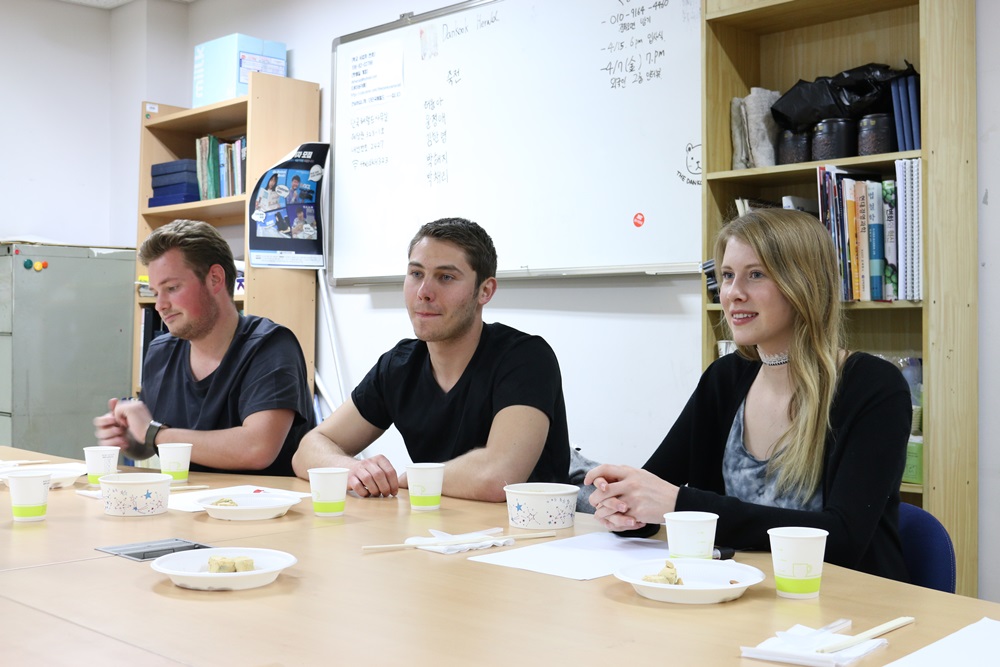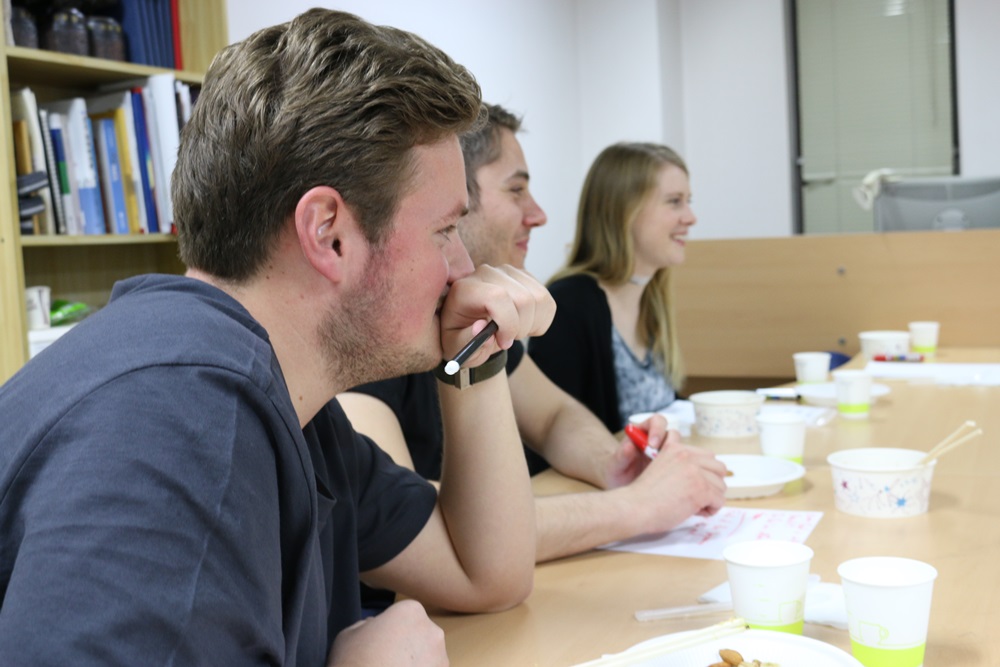Regardless of how long people have studied different languages, there are certain expressions and words that don’t easily translate into their own language. In fact, when Koreans learn English, they always have trouble using prepositions because native English speakers use prepositions by understanding the context of the sentence, which is difficult when simply translating word for word. For instance, Koreans can’t understand why native English speaker use ‘on’ when they say they saw something ‘on’ the news, a website or Facebook when directly translating. Similarly, in Korean, there are a lot of expressions and words that do not exist in English speaking countries.
 |
| ▲ Foreign students in Dankook University are on the interview (Christian, Marco and Julia) |
To find out which Korean expressions are unique to English speakers, The Dankook Herald (DKH) conducted a group interview of foreign students and shared different ideas about three categories of language differences between Korean and English: Expressions about food, personalities, and onomatopoeias. The DKH invited three international students to compare their word choice for different contexts. The students were Julia, from Ohio, USA majoring in Entrepreneurship, Marco from Germany who also studied International Business in The Netherlands, and Christian also from the Netherlands who is majoring in Business.
Category 1: Expressions about food
There are expressions that most Koreans use for describing certain tastes for food, but English native speakers hardly ever use them. For instance, ‘Goso-hada’ (literally translated as savory) and ‘Shiwon-hada’ (literally translated as cool).
The DKH provided each student three different types of food; Injeolmi (rice cake covered in bean flour), sesame oil, and almonds, and asked them to describe the taste that all three foods have in common. At first, they were not used to the texture of the injeolmi and were confused, but they all described the common taste of the food as ‘nutty’.
Next, the DKH offered them beansprout soup, a popular hangover cure in Korea, and asked them to describe the taste. All of them called it ‘refreshing’ and ‘mild’. Surprisingly, Julia understood why Koreans would call it ‘cool’ in the sense that a hot stew or a spa is invigorating and cleansing; the exact same meaning as ‘Shiwon-hada’.
Category 2: Expressions about personality
There are also expressions we use to describe a person’s character. ‘Nunchi-eopda’ (literally translated means a lack of side eyes) and ‘Naembi-guenseong’ (literally translated means temper of pots).
The former Korean word is used to describe people who are not mindful and do not behave tactfully. For example, if your friend makes jokes or pranks when you are having a hard time, Koreans will use this word to describe their insensitive friend. To see what words foreigners would use to describe this kind of personality, the DKH found video clips that show people with this attribute and asked the panelists how they would describe their character. After watching the video clips, most of them said the people were ‘annoying’ and ‘straightforward’. The DKH explained the word further and the panelists equated it to the English word ‘oblivious’, but added they do not usually use it to describe a person’s character.
Next, Koreans use Naembi-guenseong to describe people who are hot tempered, or respond immediately without thinking and get bored easily with some subjects, such as fashion trends and political issues. This time the DKH did not give any hints about the word’s meaning and asked the international students what they thought a ‘temper of pots’ would mean. They had no idea what ‘pot-like’ meant and guessed it meant useless or dumb. After enlightening them on the true meaning, Chris suggested it seemed akin to the English expression an ‘emotional rollercoaster’.
 |
| ▲ They are listening reporters' explanation about Korean expressions. |
Category 3: Expressions about onomatopoeias
All languages, have words to describe commonly known sounds, but surprisingly even these words differ. The DKH asked what the participants thought each of these onomatopoeias meant.
1. ‘Colok-Colok’ (sound of coughing)
Julia said that it sounds like a clock as in ‘tik-tok’, and Marco and Christian said that it seems like the sound you make when drinking water. Neither of them thought this word described the sound of cough very well.
2. ‘Broong-broong’ (sounds of cars)
All of them got the right answer, however English speakers usually say ‘vroom-vroom’ to describe the sound of a car.
3. ‘Asak-Asak’ (sound of eating vegetables)
Marco and Christian felt it sounded like someone in a hurry, and Julia said that it sounded like someone watching a game like ‘gogo’. While all of them got it incorrect, Julia clarified that in English, the expression ‘nom-nom’; represents the sound of eating food, but that there is no expression to describe eating vegetables only.
4. ‘Ddogak-Ddogak’ (sound made when someone walks with heeled shoes)
Again, none of the panelists guessed the right answer. Instead they assumed this word described the sound of typing on a keyboard or a passing train on a track. They felt it did not really describe the sound of someone is walking with heeled shoes. They thought it was better represented by ‘click-clack’.
5. ‘Deu-ruerung-Deu-ruerung’ (sound of snoring)
The panelists unanimously agreed this sounded like phones ringing, and did not think it sounded like someone snoring at all. In English, they usually use ‘grrrrr… grrrr’ but they do not have a word for it.
6. ‘Peo-leok-Peo-leok’ (sound of flags or clothes waving in the wind)
There were various guesses such as rain falling, bubble gum pooping or a faucet dripping, but none came close to the actual meaning.
The result of this quiz were 1 correct guess out of 6. Moreover, except for the car sound, they all did not believe these Korean onomatopoeias were effective at describing the intended sounds. At the end of the interview, the DKH asked how they felt about all these different Korean expressions. They all agreed the onomatopoeias were the most interesting ones, because while they too have expressions to describe sounds, their usage is unique. In English, they are more familiar with visual expressions.
There are actually far more interesting language differences between Korean and English, such as honorifics, mimetic words, etc. Even though the differences we discussed are neither academic nor significant discoveries, it is clear that they are some of the most weirdly enjoyable differences in our languages. Go ahead and use this content for your next conversation topic.
김한영, 박채리 dankookherald@gmail.com

![[Campus Magnifier] Let's Surf the Library!](/news/photo/202404/12496_1765_4143.jpg) [Campus Magnifier] Let's Surf the Library!
[Campus Magnifier] Let's Surf the Library!
![[Campus Magnifier] Let's Surf the Library!](/news/thumbnail/202404/12496_1765_4143_v150.jpg)





